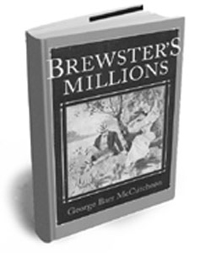 Brewster’s Millions
Brewster’s Millions
by Matt Sullivan
“I think that if he wrote a treatise on hydraulic engineering it would sell over 300,000 copies.” What name-brand author could this flabbergasted blurb be describing? Koontz? Men Are From Mars guru John Grey? L. Ron Hubbard?
If you’ve ever read a lead paragraph like that before (or if you simply read the headline), you know the answer is neither of them. The answer is George Barr McCutcheon (1866-1928), author of the 1903 novel Brewster’s Millions, and granted, the “critic” behind the hydraulic engineering quote was his brother Ben, but still…
In fact, it was just this type of assertion – that McCutcheon’s novels sold so well because of his established name – which prompted the bet that spawned Brewster’s. McCutcheon wagered with a friend that he could write a bestseller under a pseudonym, and that’s exactly what he did. Using the name Richard Greaves, he submitted the Brewster’s manuscript to a publisher he had no previous relationship with, and the best-seller that would be made into a movie seven times (including one featuring the O.J. of his day, Fatty Arbuckle) was born.
Not bad, eh? Would, say, Tom Clancy, be up to the same challenge? Sadly, he probably would. Regardless, it’s fascinating how time forgot McCutcheon, one of the most popular authors of his day. The Tippcanoe County, Indiana native’s first novel, Graustark, along with its five sequels, provoked a Bridges Of Madison County-like tourist migration to the Alpine kingdom of the title. Unfortunately, vacationing in the Balkans was a bad idea even then: These tourists were disappointed to find out that Graustark was imaginary.
This bait-and-switch did not stop McCutcheon’s novels from making him a millionaire, just as his own millions didn’t stop him from being a rebel. McCutcheon was also a playwright, and despite his great success on Broadway and in Hollywood, he was black-balled by the Frohman theater monopoly due to his controversial, liberal views. According to the book’s bio notes, “His plays took a realistic, progressive stance, satirizing Victorian mores, religious hypocrisy, and – in the age of Theodore Roosevelt – the gratuitous slaughter of wild animals.” In the age of Teddy Roosevelt, no less. Undeterred, he adapted many of these thwarted plays into best-selling novels.
In addition to his prescient stances on alcoholism (disease) and euthanasia (let ’em die), McCutcheon was also a maverick when it came to upholding author’s rights to remuneration when their work was optioned by Hollywood.
McCutcheon’s obituary ran on the front page of most newspapers in America and England, probably the last time someone who published his fiction in Good Housekeeping will be accorded such an honor. He was praised as the archetype of the small-town boy who moved to the big city (in his case, Chicago) and rocked it inside-out. As always, though, it was a New York Times editorial that said it best. Published at the time of his death, the Times noted that McCutcheon’s work had provided innocent joy to “many college boys, kitchen maids, and daughters of millionaires.”
Ah, but how does the book hold up? Pretty well. The book’s high-concept premise is a tight Hollywood pitch that could probably still get McCutcheon’s corpse a meeting with Joel Silver. (In the book, Montgomery Brewster must spend $1 million in one year, with no assets to show for it, in order to make $7 million. In the movie, adjustments were made for Reagan-era inflation and ’80s greed: Monty must spend $30 million in 30 days, with no assets to show for it, in order to make $300 million.) The stodgy writing is filled with phrases like “Pettingill interrupted grandiloquently,” but this actually gives the book a layer of unintentional humor as a bonus to the witty bon mots and well-plotted, deliriously exasperating set pieces. The formula works, right down to the (spoiler alert!) “money doesn’t matter, but isn’t it nice that we’re so rich anyways” romantic happy ending.
That said, some fans of the movie (which, until the inevitable revisionist reappraisal of the misunderstood racial allegory The Toy, is probably the most tolerated of Pryor’s non-stand-up vehicles) may be disappointed. There’s no fat buddy with a 24-carat gold catcher’s mitt pendant. The line “You didn’t know your great-grandfather was a honkey?” (race-mixin’ – tee-hee!) doesn’t appear in the book, as the book’s hero as well as the villain are white guys in suits. Brewster is also not a veteran minor league baseball pitcher, nor did he run for office in a campaign to elect “None of the above” (did Pryor inspire Perot perhaps?).
There’s also the whole “words on paper” thing. Hopefully, though, the recent Indiana University Press re-issue of the long out-of-print Brewster’s will introduce Hoosier daddy McCutcheon’s work to the next generation of college boys, kitchen maids, and daughters of millionaires. Maybe one day, when people speak of Brewster’s Millions, they won’t talk of how the dad from 7th Heaven plays Pryor’s doltish romantic nemesis, and will instead say “The book was better,” without getting the response, “That was a book?”
